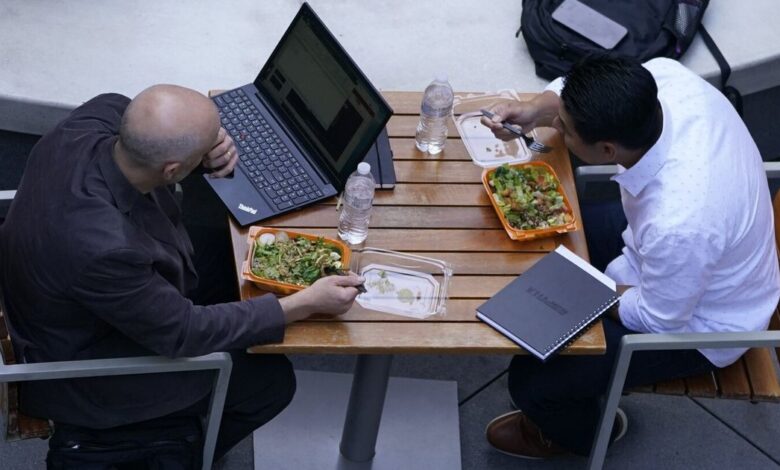7 tips for making the hours you spend at work healthier ones

On Nutrition
With long summer evenings — and summer vacations — in the rearview mirror, how we spend our time at work may feel more important. Whether you work from home or away from home, making smart choices throughout your workday can help boost your creativity and productivity while reducing fatigue and minimizing stress. In turn, this can have a positive effect on your time away from work. Here are seven tips to get you started.
1. Create a nourishing food environment. If you work outside the home, packing your own nutritious and appealing lunch and snacks can save you money and inoculate you against less-nutritious fast food or takeout options that may leave you feeling bloated and sluggish. If you buy your lunch, placing your order in advance instead of waiting until you are already hungry can make it easier to make a healthful choice.
2. Don’t dismiss hunger. When you’re busy, it’s easy to push hunger cues to the back burner, or fail to notice them at all. When you finally come up for air midafternoon — or worse, on your way home — odds are you’re ravenous and ready to attack the vending machine or stand at the kitchen counter devouring cheese and crackers before dinner.
3. Take a lunch break. Intentionally disconnecting from work midday can help you clear your head and give you much-needed energy for the afternoon. If possible, eat lunch away from your desk — preferably outside, weather permitting, so you can grab a little fresh air and sunlight. If you must eat at your desk, try to refrain from checking your email, doing work or talking about work. Eating with distractions makes it hard to notice and really taste your food, which can leave you wanting more food even if you’re not hungry.
4. Stay hydrated. Even mild dehydration can make you feel tired, headachy and unable to concentrate, which isn’t good for your productivity or your well-being. There are no hard-and-fast rules about how much to drink, but keeping a water bottle or glass at your desk to sip from makes it easier to not get fluid depleted.
5. Fit in movement, snacks and breathing breaks. If you sit at a desk all day, make a point to move at least every hour — even if you hit the gym before work or go for a long walk after work. Get up to fill your water glass, take a phone call while standing, do a few stretches or squats at your desk, or step outside to take a short walk. Feeling tense or tired? Simply taking a few deep breaths can help you feel calmer and more energized, but if you have a few minutes to sit and focus on your breath, that’s even better. Try this at least a few times during the day to relax and recharge.
6. Don’t multitask. Studies show that multitasking wastes more time than it saves and reduces our brain function over time. When you allow yourself to focus on a task or project without distractions (email, social media, open browser windows), you’ll complete it better and faster, then have the satisfaction of checking it off your to-do list.
7. Set some boundaries. Allowing work to bleed into your “off the clock” hours on a regular basis can make you less effective in both spheres. It’s important for your health and well-being to spend quality time with friends and family, as well as quality personal time to rest, relax, exercise and prepare nourishing meals.




